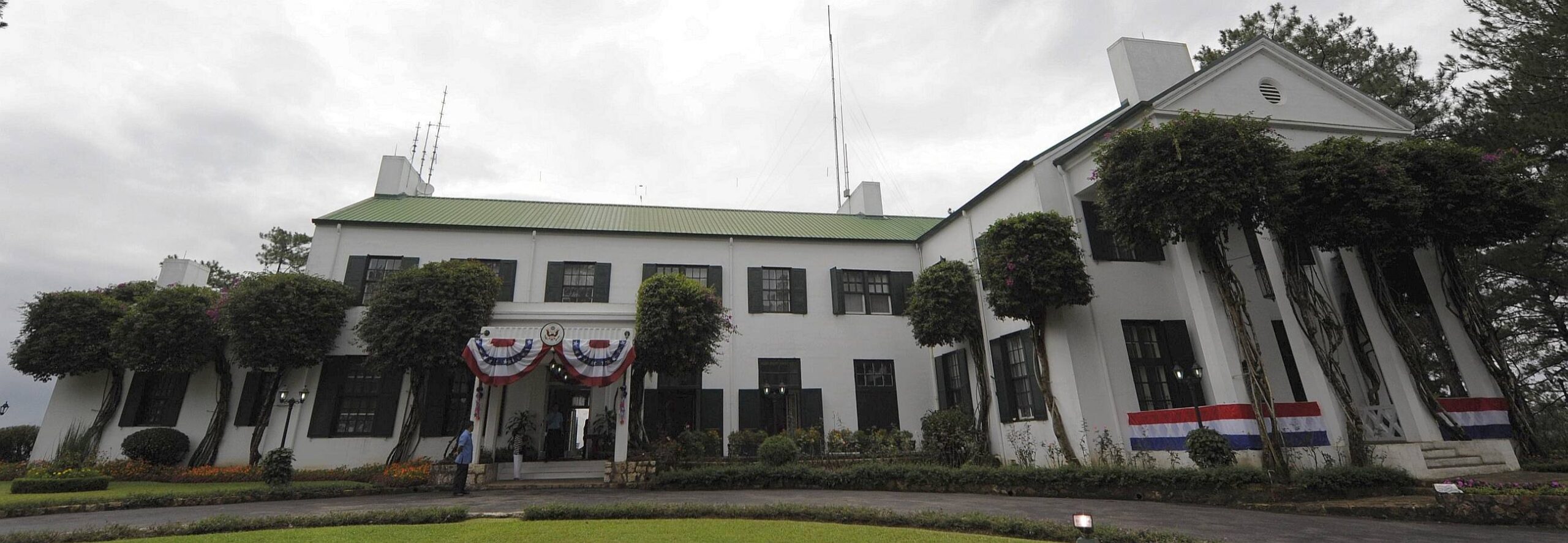
WITNESS TO HISTORY The United States Ambassador’s Residence at Camp John Hay in Baguio City, shown in this 2014 photo, witnessed the end of World War II in 1945 after Japanese Gen. Tomoyuki Yamashita signed the surrender documents in this building. —EV Espiritu
BAGUIO CITY, Philippines — The historic Ambassador’s Residence at Camp John Hay would be the major focus of next year’s 80th anniversary of the surrender of Japanese Gen. Tomoyuki Yamashita that ended the Pacific conflict during World War II, US Ambassador MaryKay Carlson said here on Tuesday.
During the holiday gathering that Carlson hosted for the media and other guests, Carlson said she had been discussing with Japanese Ambassador Endo Kazuya and his Deputy Chief of Mission Matsuda Kenichi about a jazz performance collaboration for next year’s commemoration at the Ambassador’s Residence, which she described as “steeped in history.”
READ: World War II in PH started, ended in Baguio
Carlson said these plans with the Philippines and Japan would advocate for “the power of reconciliation” among nations that fought each other for four years and left an estimated 25 million casualties, including Japanese civilians who died in the bombing of Hiroshima and Nagasaki in August 1945.
The Pacific War began in Baguio City on Dec. 8, 1941, when Japanese bombers attacked Camp John Hay a day after Japan attacked Pearl Harbor in Hawaii. It also ended in the summer capital when Yamashita signed the surrender documents at the US Ambassador’s Residence on Sept. 3, 1945.
Yamashita was taken to Camp John Hay after he surrendered in Ifugao province on Sept. 2, 1945. The Imperial Japanese Army had retreated to Baguio and further into the Cordillera mountains from advancing Allied Forces.
In her speech at the gathering here on Tuesday, Carlson said: “It’s fitting to close the year with a celebration, as the last 12 months of US-Philippine relations have given us much to celebrate. I can confidently say that 2024 was [our] banner year … as friends, partners and allies.”
“I expect this incredible positive momentum—a relationship on hyperdrive, as some of our Department of Foreign Affairs friends have said—to continue in 2025,” she said.
Carlson did not directly address the assumption on Jan. 6 next year of President-elect Donald Trump, following a contentious political campaign in her country.
But she stressed: “During numerous visits to the Philippines in the last year, leaders from our executive and legislative branches, representing both sides of the political spectrum, have been unequivocal in expressing their support for the Philippines. I am confident that the strong bipartisan support the Philippines enjoys will continue through our presidential transition and well into the future.”
At her media briefing earlier, Carlson pointed out that more visas have been issued to Filipinos visiting, studying, or migrating to the United States in the past years, while the number of Americans who have been working, living, or who have retired in the Philippines has grown to 700,000.
The ambassador also said American companies are studying how to invest in clean energy projects for the Philippines.
The visits to the Philippines by US Secretary of State Antony Blinken and US Defense Secretary Lloyd Austin III reflected how “our relationship is in good shape,” she said.
“During Secretary Austin’s second visit, just two weeks ago, we broke ground on a new command and control fusion center at Camp Aguinaldo, which will allow our forces to coordinate on exercises and operations in person and in real-time, a significant step forward in our alliance,” Carlson said.
‘No better place’
“There is no better place to celebrate this year’s achievements and look with hope to the future than here in beautiful Baguio, a city that uniquely represents the depth and the strength of the US-Philippine bilateral relationship,” she said in her speech. Baguio was designed, built, and opened in 1909 by the American colonial government.
“Next year, we will mark the 80th anniversary of the end of World War II. .. right here in this Residence when, on Sept. 3, 1945, General Yamashita signed the instrument of surrender in front of Gen. Jonathan Wainwright—on the very table that still graces the dining room. I think Gen. Wainwright would be more than pleased by how far the US-Philippine relationship has come in the 80 years since that historic day,” she said.
A rendering of Yamashita’s surrender by National Artist Fernando Amorsolo hangs above the Residence’s fireplace.

